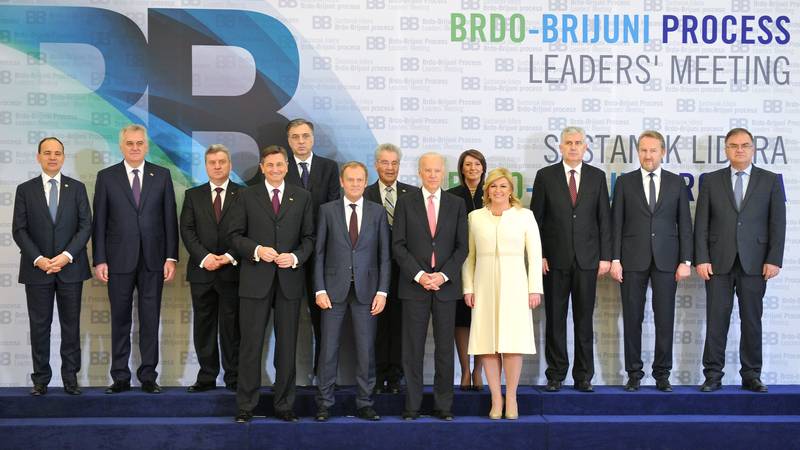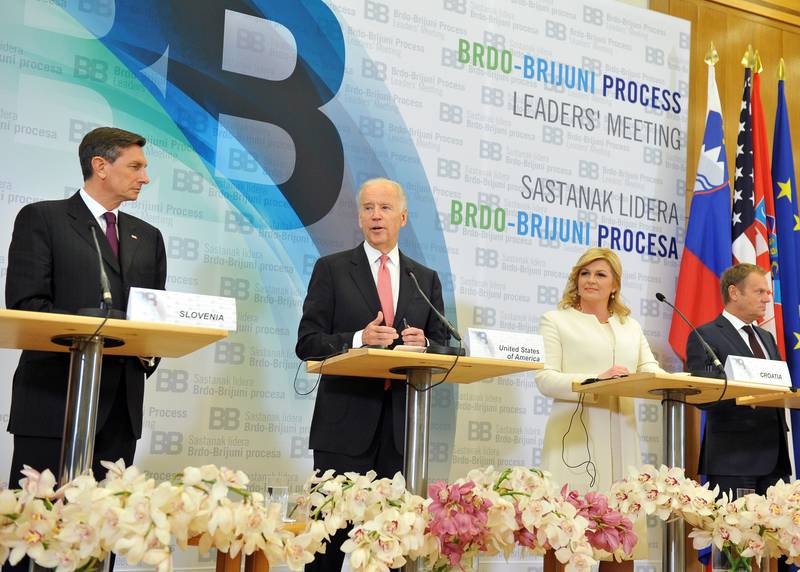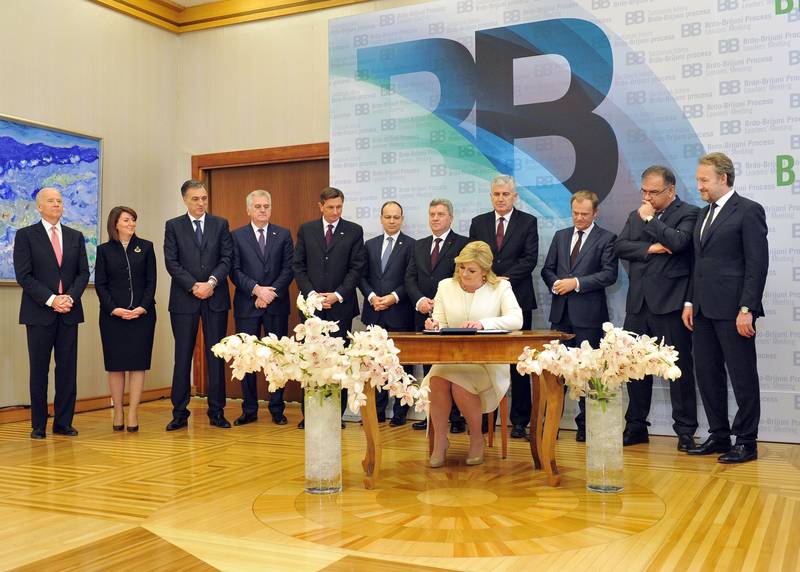Croatia Suggests Dropping the Term "Western Balkans"
Adelina Marini, November 27, 2015
 Nearly a year after her winning the elections, Croatian President Kolinda Grabar-Kitarović scores her first big foreign affairs success. It happened at the summit of the Brdo-Brijuni Process states in Zagreb on November 25th, which had American Vice-President Joe Biden as a guest of honour. European Council President Donald Tusk (Poland, EPP) also participated. The Brdo-Brijuni initiative was created two years ago by the presidents of Croatia and Slovenia – Ivo Josipović and Borut Pahor. Their aim was to start a regular dialogue among the South-East European countries, especially the part that had not yet joined North-Atlantic structures. The ambition of Mr Josipović and Mr Pahor was for a leader of a EU member state to be the guest of honour of every regular summit. So far the invitations had been positively answered by French President François Hollande in 2013 and German Chancellor Angela Merkel, who attended the summit in Dubrovnik last year.
Nearly a year after her winning the elections, Croatian President Kolinda Grabar-Kitarović scores her first big foreign affairs success. It happened at the summit of the Brdo-Brijuni Process states in Zagreb on November 25th, which had American Vice-President Joe Biden as a guest of honour. European Council President Donald Tusk (Poland, EPP) also participated. The Brdo-Brijuni initiative was created two years ago by the presidents of Croatia and Slovenia – Ivo Josipović and Borut Pahor. Their aim was to start a regular dialogue among the South-East European countries, especially the part that had not yet joined North-Atlantic structures. The ambition of Mr Josipović and Mr Pahor was for a leader of a EU member state to be the guest of honour of every regular summit. So far the invitations had been positively answered by French President François Hollande in 2013 and German Chancellor Angela Merkel, who attended the summit in Dubrovnik last year.
The summit in Dubrovnik was held just two days after the traditional Croatia Forum, held every year in Dubrovnik, which gathers ministers from the region on different subjects. At it, participants said many things to each other’s faces, marking another step towards reconciliation and building an atmosphere of trust, despite the many unsolved regional and bilateral issues. The meeting in Zagreb on November 25th was an extraordinary one. The regular summit was held several months earlier, but the ambition of the Croatian president ever since her pre-election campaign had been the return of the United States to the region. As an American graduate and former Assistant Secretary General of NATO Ms Grabar-Kitarović believes that the future of the region could not be built without American aid. Thus, a second summit had to be held, considering the American vice-president's busy schedule.
Is the USA coming back to South-East Europe?
Kolinda Grabar-Kitarović stated at the end of the several-hour long summit in the Croatian capital that everybody agreed that there was a need for a regular dialogue on an operational level among the USA, the EU, and the South-East European countries (SEE) on major global challenges, including terrorism, extremism, and radicalism. The Croatian president is not the only one in the region who thinks that the US pulling out of the region is being felt and that this needs to change. Vice-president Joe Biden, however, did not agree that the USA had left the region. “The US never left. Let me be clear”, he said. His speech, however, lasted for more than 16 minutes and touched on a large number of subjects, showing that there was a lot to catch up.
The USA have multi-billion investments in Europe. “We’ve gone nowhere”, he added, but reminded that his country had other responsibilities around the world. Actually, America did pull out of the region, following its stabilisation after the end of the destructive war that accompanied the disintegration of former Yugoslavia. The vision of the White House at that time was that Europe needed to take responsibility for the future of the region, which is part of its geography. And despite all Western Balkan countries stated their wish to join the EU, and some of them NATO, as their strategic priority, Brussels did not seem able to fill the shoes of the USA, which have the name of a global superpower, something the EU keeps proving it is not capable of being. Since the end of the wars, all countries are on the Euro-Atlantic path with a different speed. The problem, however, is that this process is being blocked for some of them, as is the case of Macedonia for example, whose advancement is stopped by Greece.
Bosnia and Herzegovina is also a major problem, but had been adamantly neglected by the EU, until it reminded of itself with the mass young people’s riots of 2014. What the EU can be proud of is the dialogue between Belgrade and Pristina, whose advancement opened the way for Serbia and Kosovo towards the EU. Something Joe Biden did not fail to note as a European success. Beyond this, however, the EU’s successes remain negligible and the challenges get larger. The lack of unity within the Union is the main reason for the region’s progress. Thus, USA remain a preferred partner in a region, which still needs a strong hand, especially in today’s turbulent geopolitical times. The Western Balkans are a region, which is especially vulnerable in times of heightened tension among global powers, and the EU proves itself unable to react adequately in times of crisis. This became painfully clear during the refugee crisis.
The EU was sluggish and hesitant as well over the sanctions levied on Russia for annexing the Ukrainian peninsula of the Crimea, and we should not forget how much time and energy it took to deal with the euro area crisis. In all these crises the USA kept their distance, for they have re-oriented themselves towards the Pacific region. Their presence in the Middle East has markedly  diminished, which many interpret as the reason for the blooming chaos in the region. When they do decide to intervene, on the other hand, they do it swiftly.
diminished, which many interpret as the reason for the blooming chaos in the region. When they do decide to intervene, on the other hand, they do it swiftly.
European President Donald Tusk did not seem especially pleased by the heightened attention towards the USA. He spoke after Biden and was also introduced by Kolinda Grabar-Kitarović as a guest of honour, although he felt more like a host in a region, which the EU has been trying to keep busy with over the past two years. Moreover, his Zagreb appearance was the last stop of his tour of countries in the region. Before it, he visited Albania, Macedonia, Serbia, and BiH. Biden devoted much of his opening statement to the region and his numerous meetings here. He remembered coming here when Tito was president of Yugoslavia, but he met Milošević and Tuđman as well. He fondly recalled the father of Bakir Izetbegović – Alija, whom he shared a bunker with. Donald Tusk struck back by saying he visited Zagreb just three months ago. Although he did not look enthusiastic, he stated that he fully supported the initiative for a regular dialogue between the EU, the USA, and the SEE states.
Enlargement needs a catalyst
Who and how much got engaged with the region remained in the background after all participants united around the conclusion that the process of integration in the Euro-Atlantic structures needs to be reinvigorated. In their joint declaration, the presidents of Serbia, Macedonia, Montenegro, Kosovo, Albania, Croatia, Slovenia, Bosnia and Herzegovina, and also Austria, admit that even though the process of EU enlargement is an effective instrument for transformation and modernisation of candidate states, their commitment to this process needs new energy. “This process has to be considered as not just a technical exercise, but a paramount political process”, says the document.
According to Vice-president Biden, accession is an important process, because it drives countries towards necessary reforms. He did not spare the presidents of Western Balkan countries telling them which are the largest challenges they are facing – battling corruption, enforcing rule of law, ensuring the independence of media, but also reforms of the military and intelligence branches. He reminded that the USA have provided over 130 million dollars this year alone helping countries of the region in implementing these reforms. Joe Biden used strong words, calling corruption a cancer, which robs nations of opportunities and stressed on the energy independence not just of South-East Europe, but the entire EU. He sent a strong message to Russia as well, without naming it explicitly, in saying that the door of NATO remains not just open, but wide open to all states of the region that wish it. Moreover, he reminded that he was not going to presume to tell the leader of any state what was good for his country, but that the Euro-Atlantic perspective has no alternative when peace, stability, and prosperity are sought.
He placed special emphasis on the strong American support to the accession of Montenegro to NATO, which is getting stronger and stronger resistance from Russia. Serbian President Tomislav Nikolić stated after the meeting that he reminded the American vice-president that Serbia had no wish to file an application for joining NATO. He said he received Mr Biden's understanding. To Serbia, at the moment, the most important thing is to start EU accession negotiations as soon as possible and counts on the USA to influence its European partners. A day after the summit in Zagreb, the head of the EU Delegation to Serbia, Michael Davenport, announced that the first negotiation chapters are expected to be opened within weeks. The decision for it must be made by the Council of the EU and approved by the leaders at their summit in Brussels on December 17-18.
Take the Western Balkans out of political jargon
 The summit was a huge foreign affairs success to Kolinda Grabar-Kitarović, who urged during the meeting that the term “Western Balkans” is dropped from the political vocabulary. According to sources from her team, quoted by the weekly political magazine Globus, this term predisposes to ghettoization. She explained to media on Wednesday evening that this region should start to be perceived as part of South East Europe. “I know it will not be easy to drop the name and that it is a technical term, used in many institutions and documents”, she said, but Joe Biden immediately responded by starting to use both terms in his statement.
The summit was a huge foreign affairs success to Kolinda Grabar-Kitarović, who urged during the meeting that the term “Western Balkans” is dropped from the political vocabulary. According to sources from her team, quoted by the weekly political magazine Globus, this term predisposes to ghettoization. She explained to media on Wednesday evening that this region should start to be perceived as part of South East Europe. “I know it will not be easy to drop the name and that it is a technical term, used in many institutions and documents”, she said, but Joe Biden immediately responded by starting to use both terms in his statement.
Montenegrin President Filip Vujanović stated, quoted by Montenegrin media, that he sees this as the most successful summit of the Brdo-Brijuni Process, mainly due to the return of the USA to the region and the strong support declared for the small Balkan state’s NATO membership. This summit is in fact the next in a row of successful ones, for attention was restored to the Western Balkans region due to the previous ones. It was exactly the Brdo-Brijuni initiative and the participation of German Chancellor Angela Merkel in one of the summits that led to the Berlin Process, through which Germany committed permanently to the European integration of the Western Balkans. Including the USA in the process is extremely important at a time, when all participants agreed this is a crucial moment for the EU, NATO, and the international community. Moreover, participants in the meeting agreed to a much closer cooperation at an operational level in the fight against terrorism, radicalisation, and also dealing with the refugee crisis. Despite the return of the USA, however it may be manifested, the main responsibility for the region’s prosperity remains with the EU.
Translated by Stanimir Stoev
 Bakir Izetbegovic, Andrej Plenkovic | © Council of the EU
Bakir Izetbegovic, Andrej Plenkovic | © Council of the EU Aleksandar Vucic, Recep Tayyip Erdogan | © Serbian Presidency
Aleksandar Vucic, Recep Tayyip Erdogan | © Serbian Presidency Jean-Claude Juncker, Zoran Zaev | © European Commission
Jean-Claude Juncker, Zoran Zaev | © European Commission Kolinda Grabar-Kitarovic | © KGK
Kolinda Grabar-Kitarovic | © KGK Jozo Rados | © European Parliament
Jozo Rados | © European Parliament Aleksandar Vucic, Andrej Plenkovic | © Vlada RH
Aleksandar Vucic, Andrej Plenkovic | © Vlada RH